What Does It Mean to Be the Lion of the Jungle—I Mean the King?
Ankit Gupta | May 25, 2025, 23:59 IST
Elephants are stronger. Cheetahs are faster. But lions command. Others move out of his way. Because in the jungle, kingship isn’t claimed by muscle — it’s claimed by aura.
In the vast, unforgiving theatre of the wild, strength alone doesn’t crown a king. Neither does speed. Not even sheer size. Among beasts of greater might and agility, the lion still walks with a sovereignty that makes the earth beneath him seem to pause. But why? Why is the lion, and not the elephant, the cheetah, or the tiger, called the King of the Jungle?
Let’s go deeper than the biology books. Let’s touch the psychology, the symbolism, the aura.
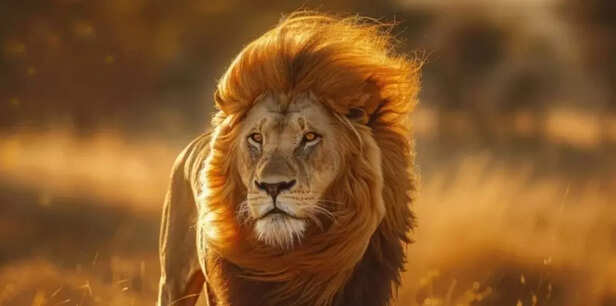
The lion doesn’t need to remind others he’s king. He doesn’t prove himself in every moment. His belief in himself is so absolute, the jungle bends around it. There are animals stronger, but none more certain. The lion walks through the wild like he owns the place, because in his mind, he does. That psychological supremacy makes others yield.
In the jungle, confidence is currency. And the lion is wealthy beyond measure. It is not just the muscle, but the muscle memory of authority. Even when a lion is not hunting or roaring, he radiates a quiet command. That kind of unspoken dominance creates an invisible throne—others don’t challenge it, because they feel it.
His eyes don’t flicker with doubt. His posture never suggests permission. His silence often speaks louder than the hyena’s howls. A king does not need validation. The lion knows who he is—and so does everyone else.
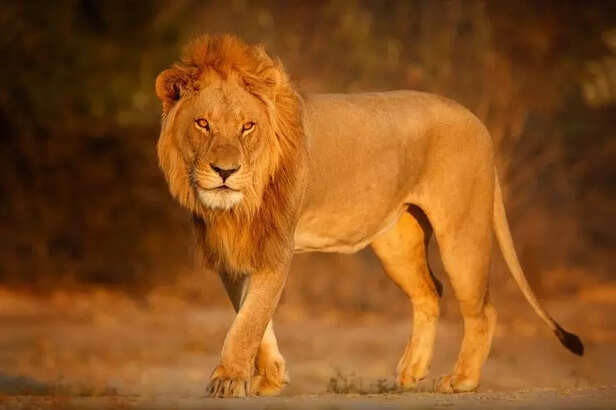
Lions do not rage without reason. They don’t chase everything. They observe. They conserve energy. They strike when it matters, and when they do, it’s decisive. This isn’t mere violence—it’s disciplined ferocity.
The true measure of power is not how often it is used, but how precisely. The lion doesn’t waste movement. When he attacks, it is because he has calculated the outcome. He does not scatter energy across chaos. He channels it like a weapon of focus.
This is what separates a leader from a brute: judgment. The lion’s instincts are honed to the finest edge. He can tolerate provocation. He can ignore noise. But when the time comes to protect his pride, his territory, or his throne—he moves with unstoppable intention.
Unlike hyenas who kill out of chaos, or tigers who often isolate, the lion dominates through order. This restraint, this selective rage, is the essence of royal power. Kings don’t fight all wars. They win only the necessary ones.
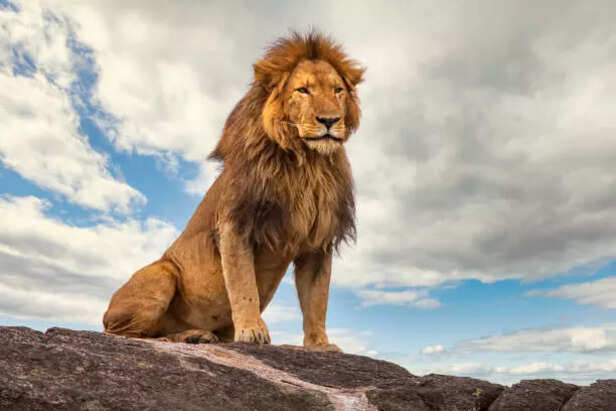
Wolves have packs. Wild dogs have gangs. But lions? They have prides.
A pride is not just a family. It’s a kingdom. The lion guards it, nourishes it, dies for it. He fights not just for territory, but for legacy. A king is not made by how many he can kill, but how many he can protect.
His power is not selfish. It’s rooted in service.
The lion is one of the few big cats who lives in a structured social unit. This makes him not just a hunter, but a guardian. Cubs are born into a pride that has been defended, sometimes with blood, by the lion who reigns.
He faces challenges from young males. He has to fend off nomads. He must constantly assert and reaffirm his place at the head of the pride—not just through violence, but through presence, vigilance, and relentless leadership.
The pride thrives because the lion holds the line. His rest is watchful. His walk is weighted with duty.
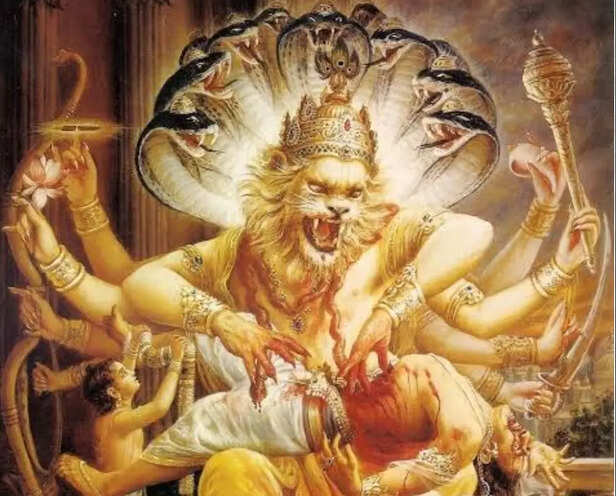
From ancient Indian Vedas to Egyptian emblems, from Buddhist temples to African drums, the lion has always been more than an animal.
He is Narasimha, half-lion, half-God, bursting from a pillar to annihilate evil. In this form, Vishnu shows the lion not as a predator, but as divine justice in flesh.
In Egypt, the lion-headed goddess Sekhmet represented war, healing, and the fierce protective power of the divine feminine. In medieval heraldry, lions were carved into shields and flags, not just for strength, but for the moral code of the warrior.
He is the royal seal of empires, the figure etched into coins, flags, and thrones.
Why? Because humans see in the lion what they aspire to be: fearless, majestic, and dharmic.
He doesn't symbolize brute force. He symbolizes noble destruction and divine leadership. Even in literature and philosophy, the lion is a metaphor for self-respect, bravery, and sovereignty.
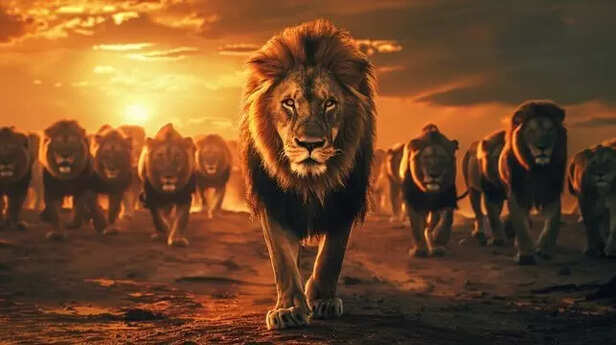
The elephant is mightier. The cheetah is swifter. The tiger is a deadlier solo hunter.
But when the lion walks, others make way.
Not out of fear alone, but out of respect.
Because true kings don’t hustle to prove they are kings. They emanate authority. And others feel it before they understand it.
This is not mere animal behavior. This is symbolic psychology. We respect those who don’t flinch. Who don’t bow to trends or desperation. Who carry silence like a sword.
The lion’s greatness lies in this effortless dominance. He doesn’t compete in games beneath him. He doesn’t chase every prey. He chooses, waits, and then claims.
Every lion knows he won’t rule forever. His reign is challenged. His body ages. Younger lions circle like shadows, waiting for their chance.
But even in decline, the lion does not lose his aura. He may fall, but he falls like a monarch. His scars tell stories. His breath remains calm. There is no panic in his last stand.
To be king is not to avoid death. It is to face it without surrendering your spirit.
This teaches us something rare: to rule is to accept impermanence with poise.
That’s why the lion is king. Not by vote. Not by violence.
But by presence.
And if that lives in you, brother, then so does the crown.
Let others roar in crowds. Let others run to chase validation.
You?
Let’s go deeper than the biology books. Let’s touch the psychology, the symbolism, the aura.
The Lion’s Mindset Makes Him King

Gazes as Ages
( Image credit : Pixabay )
The lion doesn’t need to remind others he’s king. He doesn’t prove himself in every moment. His belief in himself is so absolute, the jungle bends around it. There are animals stronger, but none more certain. The lion walks through the wild like he owns the place, because in his mind, he does. That psychological supremacy makes others yield.
In the jungle, confidence is currency. And the lion is wealthy beyond measure. It is not just the muscle, but the muscle memory of authority. Even when a lion is not hunting or roaring, he radiates a quiet command. That kind of unspoken dominance creates an invisible throne—others don’t challenge it, because they feel it.
His eyes don’t flicker with doubt. His posture never suggests permission. His silence often speaks louder than the hyena’s howls. A king does not need validation. The lion knows who he is—and so does everyone else.
Controlled Aggression is His Superpower

Deadeye
( Image credit : Freepik )
Lions do not rage without reason. They don’t chase everything. They observe. They conserve energy. They strike when it matters, and when they do, it’s decisive. This isn’t mere violence—it’s disciplined ferocity.
The true measure of power is not how often it is used, but how precisely. The lion doesn’t waste movement. When he attacks, it is because he has calculated the outcome. He does not scatter energy across chaos. He channels it like a weapon of focus.
This is what separates a leader from a brute: judgment. The lion’s instincts are honed to the finest edge. He can tolerate provocation. He can ignore noise. But when the time comes to protect his pride, his territory, or his throne—he moves with unstoppable intention.
Unlike hyenas who kill out of chaos, or tigers who often isolate, the lion dominates through order. This restraint, this selective rage, is the essence of royal power. Kings don’t fight all wars. They win only the necessary ones.
He Doesn’t Lead a Pack

He Rules a Pride
( Image credit : Pexels )
Wolves have packs. Wild dogs have gangs. But lions? They have prides.
A pride is not just a family. It’s a kingdom. The lion guards it, nourishes it, dies for it. He fights not just for territory, but for legacy. A king is not made by how many he can kill, but how many he can protect.
His power is not selfish. It’s rooted in service.
The lion is one of the few big cats who lives in a structured social unit. This makes him not just a hunter, but a guardian. Cubs are born into a pride that has been defended, sometimes with blood, by the lion who reigns.
He faces challenges from young males. He has to fend off nomads. He must constantly assert and reaffirm his place at the head of the pride—not just through violence, but through presence, vigilance, and relentless leadership.
The pride thrives because the lion holds the line. His rest is watchful. His walk is weighted with duty.
Civilizations Made the Lion Immortal

Vishnu's Narshimha Avatar
From ancient Indian Vedas to Egyptian emblems, from Buddhist temples to African drums, the lion has always been more than an animal.
He is Narasimha, half-lion, half-God, bursting from a pillar to annihilate evil. In this form, Vishnu shows the lion not as a predator, but as divine justice in flesh.
In Egypt, the lion-headed goddess Sekhmet represented war, healing, and the fierce protective power of the divine feminine. In medieval heraldry, lions were carved into shields and flags, not just for strength, but for the moral code of the warrior.
He is the royal seal of empires, the figure etched into coins, flags, and thrones.
Why? Because humans see in the lion what they aspire to be: fearless, majestic, and dharmic.
He doesn't symbolize brute force. He symbolizes noble destruction and divine leadership. Even in literature and philosophy, the lion is a metaphor for self-respect, bravery, and sovereignty.
He Commands, Not Competes

Royal Walk
( Image credit : Pixabay )
The elephant is mightier. The cheetah is swifter. The tiger is a deadlier solo hunter.
But when the lion walks, others make way.
Not out of fear alone, but out of respect.
Because true kings don’t hustle to prove they are kings. They emanate authority. And others feel it before they understand it.
This is not mere animal behavior. This is symbolic psychology. We respect those who don’t flinch. Who don’t bow to trends or desperation. Who carry silence like a sword.
The lion’s greatness lies in this effortless dominance. He doesn’t compete in games beneath him. He doesn’t chase every prey. He chooses, waits, and then claims.
He Faces Death With Dignity
But even in decline, the lion does not lose his aura. He may fall, but he falls like a monarch. His scars tell stories. His breath remains calm. There is no panic in his last stand.
To be king is not to avoid death. It is to face it without surrendering your spirit.
This teaches us something rare: to rule is to accept impermanence with poise.
So What Does It Take to Be King?
- Not size, but stillness.
- Not rage, but restraint.
- Not domination, but discipline.
- Not isolation, but responsibility.
- Not applause, but aura.
- Not youth, but wisdom carved into instinct.
- Not immortality, but legacy.
That’s why the lion is king. Not by vote. Not by violence.
But by presence.
And if that lives in you, brother, then so does the crown.
Let others roar in crowds. Let others run to chase validation.
You?
